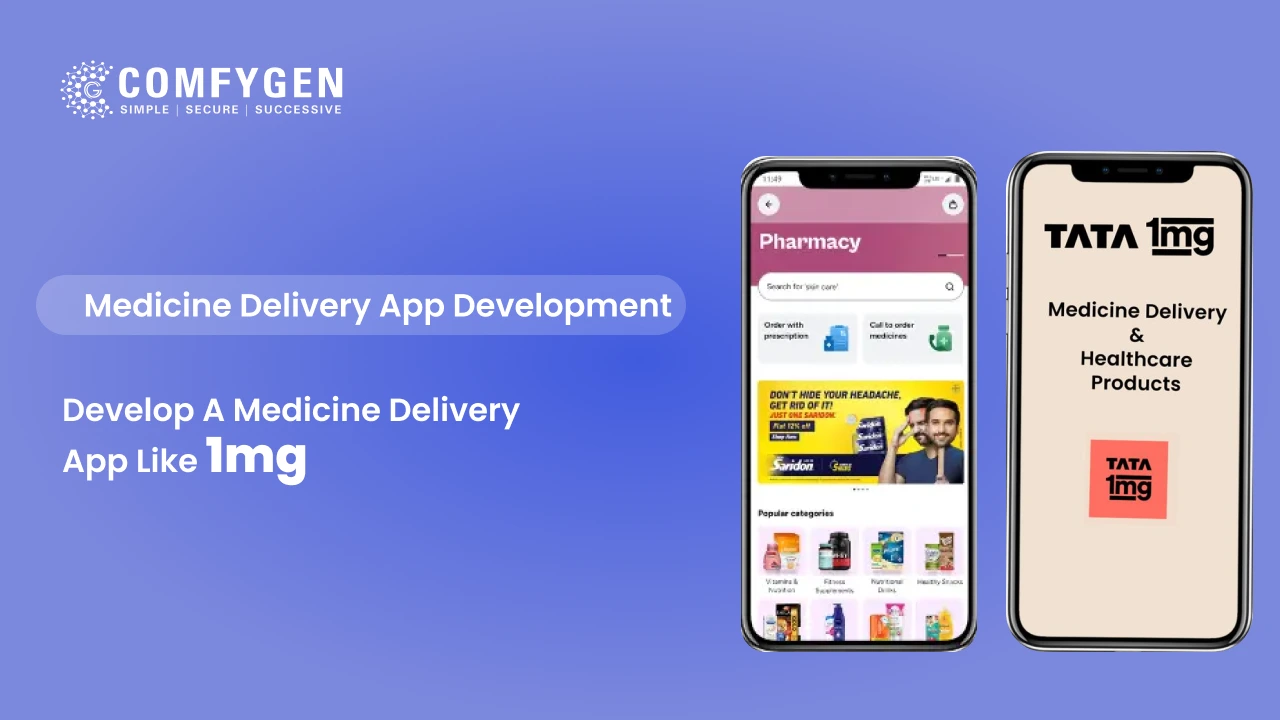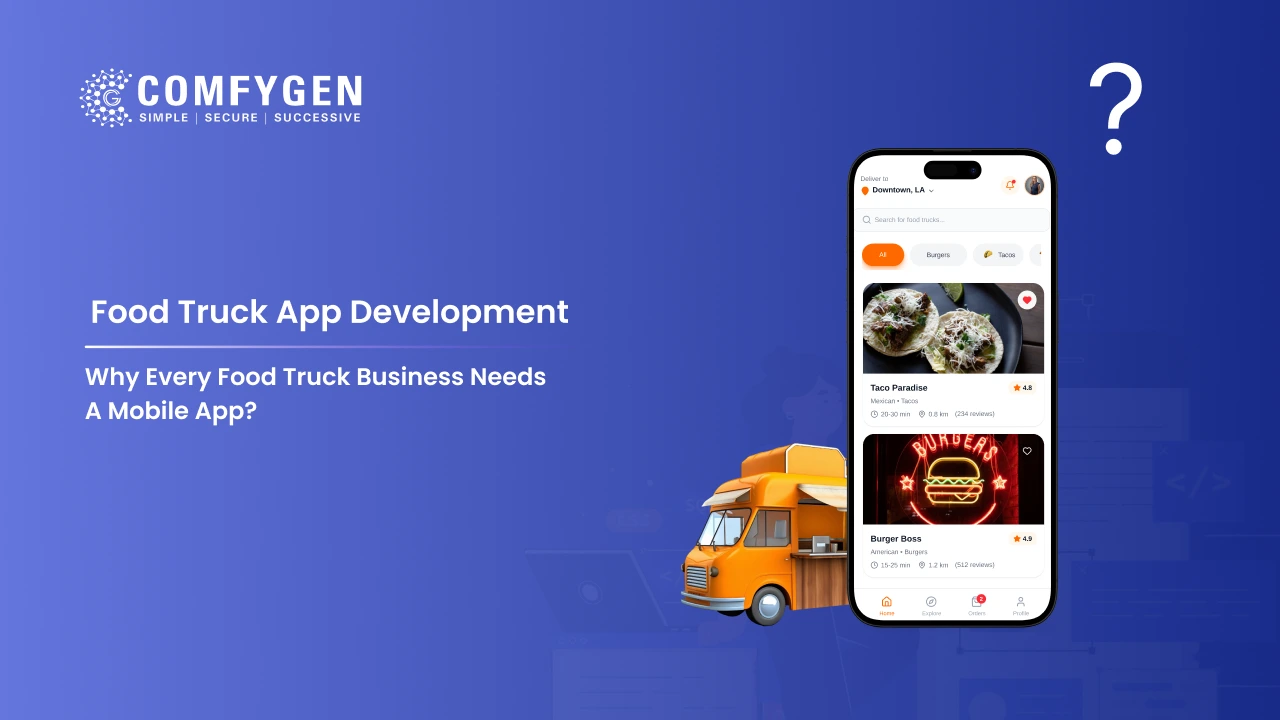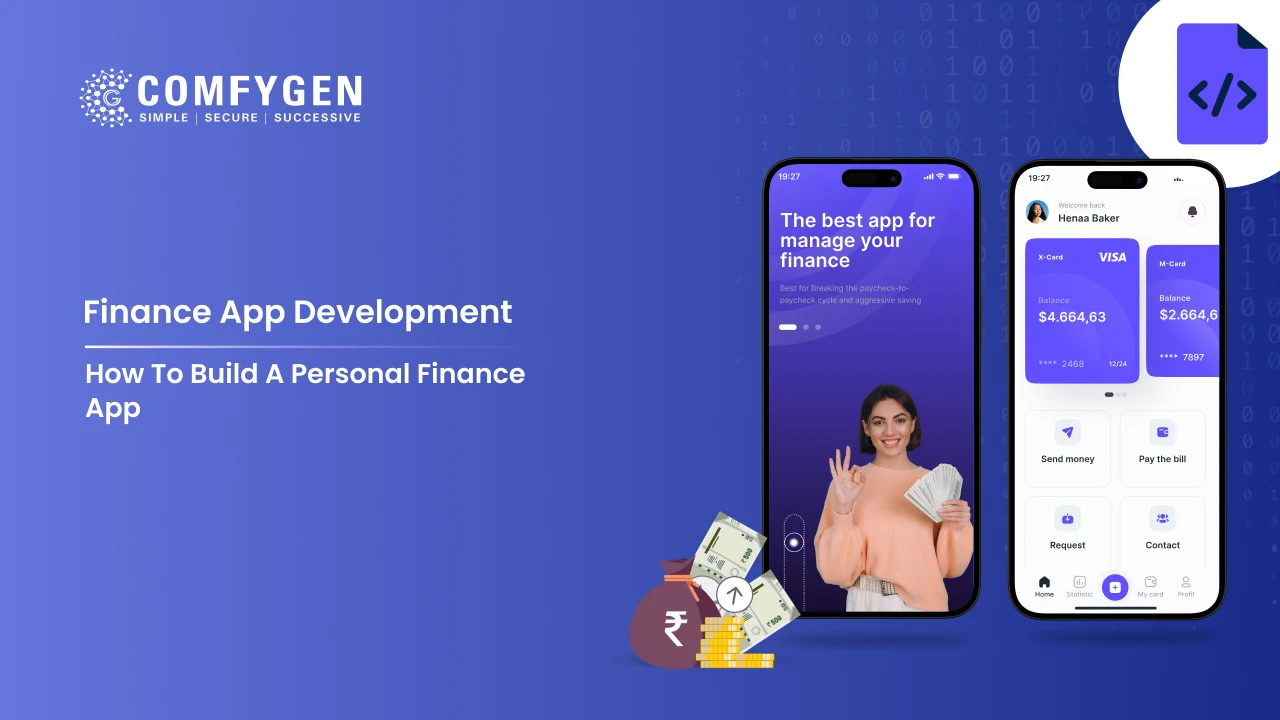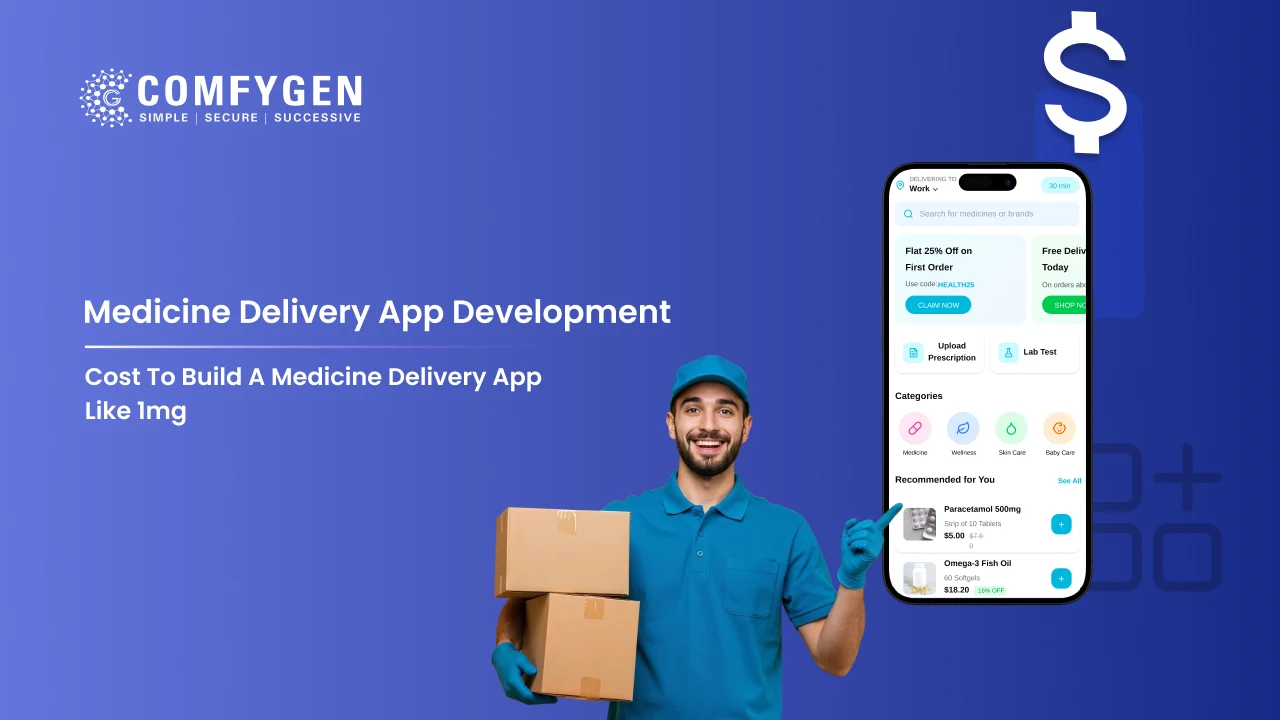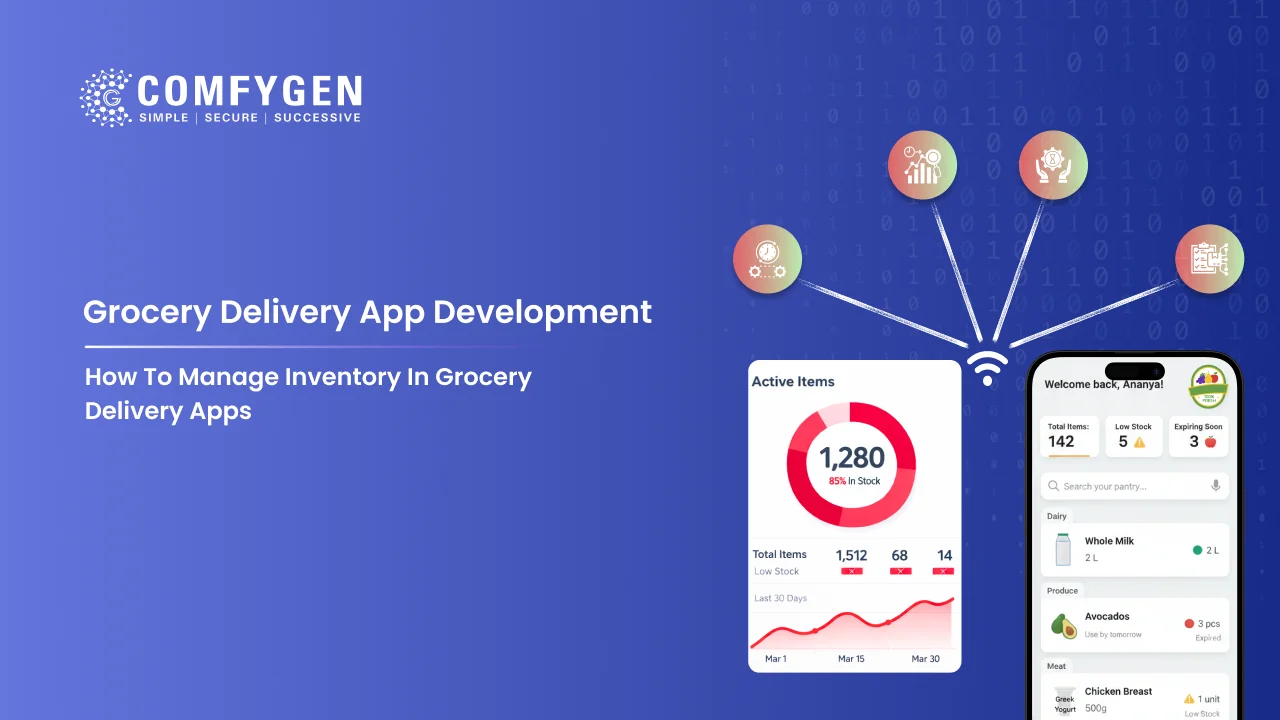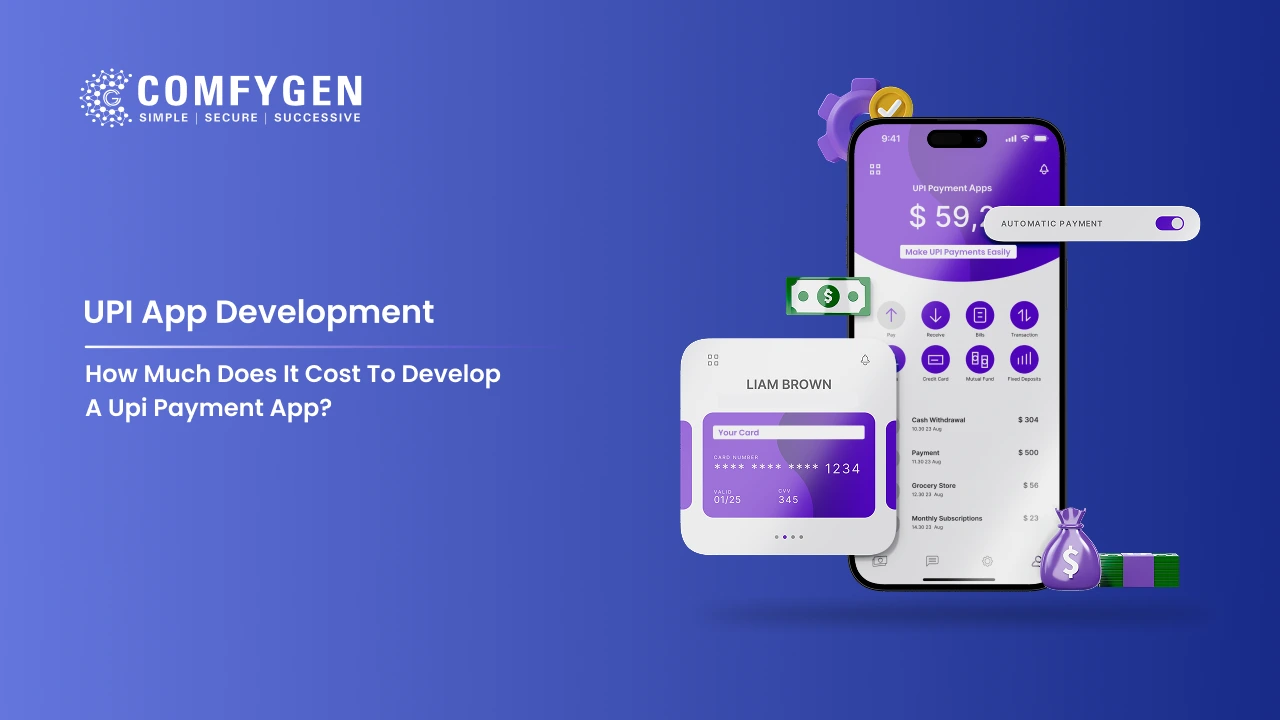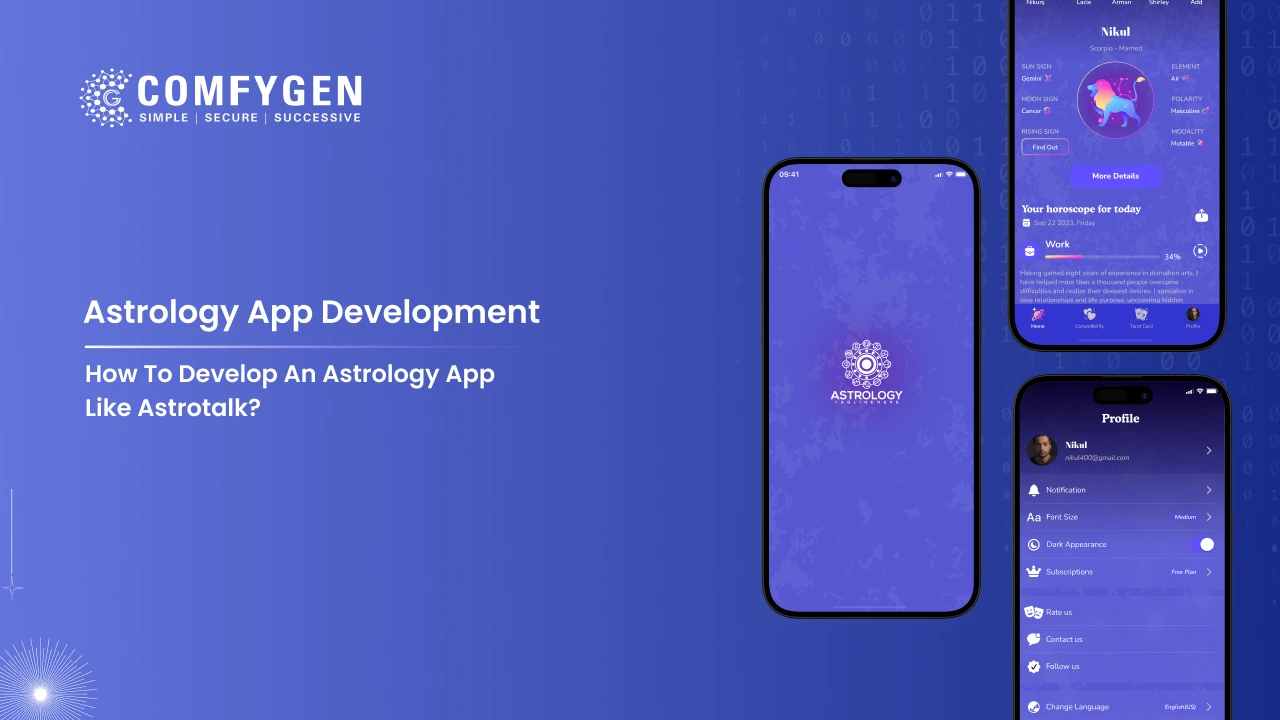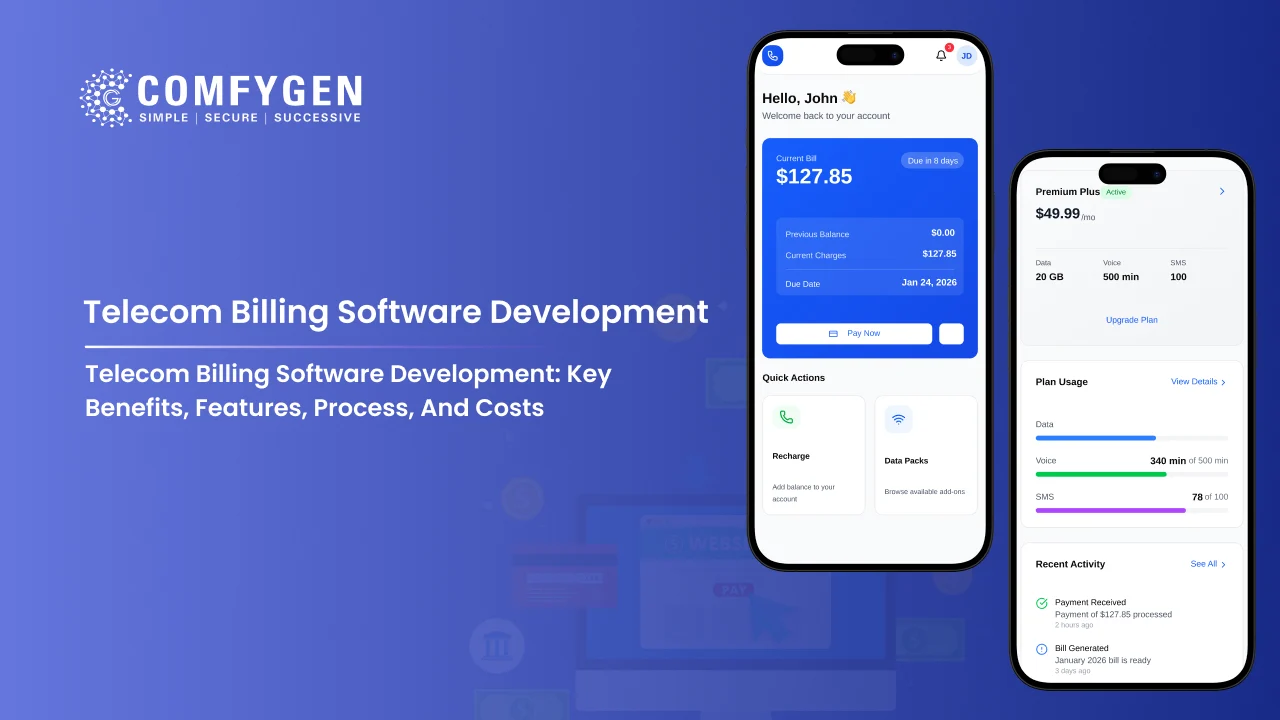How to Build a Medicine Delivery App Like 1mg in 2026?
A medicine delivery app like 1mg has revolutionized how patients access medications, offering doorstep delivery and transforming the healthcare sector with digital convenience.
Besides making it easy to buy medicines, these pharmacy apps also bring innovations to the industry.
Pharmacy and medical stores really benefit from it. The pharmacy industry is one of the most competitive in the world, with many companies competing to reach the top. They can do their service much more easily with the help of the mobile app.
Tata 1mg is one of the top online pharmacy delivery apps in India today. You can now order prescription and over-the-counter medicine from the comfort of your own home.
Do you want to develop a medicine delivery app like Tata 1mg but are curious about its cost, benefits, process and features? The purpose of this blog is to help you in times of need. Mobile applications and software are not only booming in one direction; rather, they will cover multiple vertical industries.
We can order medicines at home, so no dependencies at all even when we are sick. With the high convenience and surging demand, hoping to build a medicine delivery app like 1mg with profits expectations is quite a valuable plan.
For the 1mg clone app development, we have put all the necessary details in this blog. The demonstration will explain about the app’s monetization, services it is offering, how to build a medicine delivery app like 1MG, et cetera.
Let’s dive into the information and know the important detailed images for the medicine delivery app development.
Current Market Stats on Medicine Delivery Industry
- The projected revenue in the online pharmacy market is set to reach US$42.70 Billion by 2025.
- The market is experiencing exponential growth.
- Tata 1MG observed a significant 160% surge in operating revenue during the financial year ending on March 31, 2023.
- The valuation of Tata 1MG rose to 1627 Crores from 627 crores previously.
What is a Medicine Delivery App?
Medicine delivery apps are becoming increasingly popular among users, primarily because they offer the convenience of having medicines and medical essentials delivered straight to your doorstep with just a few taps on your screen.
These pharmaceutical or drug delivery apps saw a significant rise in recognition during the pandemic when many people were unable to visit physical medical or pharmacy stores.
The ease of ordering and the safety of home delivery made these apps an essential service during those challenging times, and their popularity has continued to grow ever since.
By providing a hassle-free way to access necessary medications, these apps have become a go-to solution for many, ensuring that health needs are met promptly and efficiently without leaving home.
Top Benefits of Developing a Medicine Delivery App Like 1mg
In the digital age, medicine delivery apps have revolutionized the healthcare industry by providing unparalleled convenience and accessibility. Here are the top benefits of developing a medicine delivery app like 1mg in below:
1. 24/7 Accessibility for Users
A medicine delivery app like 1mg allows customers to order medicines anytime, from anywhere. This improves convenience for users and boosts customer satisfaction, especially in emergencies. It also increases app engagement and builds trust in your pharmacy delivery brand.
2. Wider Customer Reach
You can serve customers beyond your physical store location. A medicine delivery app helps you target a larger audience across cities and rural areas, increasing brand visibility and sales. It’s ideal for expanding your pharmacy business digitally.
3. Easy Prescription Upload
Users can upload their prescriptions directly through the app. This makes the process fast and error-free for both customers and pharmacists, ensuring accurate order fulfillment. It also adds a professional edge to your 1mg-like app development solution.
4. Automated Refill Reminders
With smart notifications, your app can remind users to reorder medicines before they run out. This feature enhances customer loyalty and drives repeat purchases—boosting the success of your medicine delivery app.
5. Multiple Payment Options
Offer secure and flexible payment methods like UPI, credit cards, wallets, and COD. Multiple payment options improve the user experience and help increase conversion rates on your pharmacy delivery app.
6. Real-Time Order Tracking
Real-time delivery tracking lets customers know where their medicines are and when they’ll arrive. It builds transparency and trust—two major pillars of a successful pharmacy delivery app like 1mg.
7. Digital Health Records & Reports
A medicine delivery app can store past prescriptions, invoices, and test reports digitally. This makes health tracking easier for users and increases app retention rates through enhanced utility.
8. Boosts Pharmacy Revenue
Going digital with a 1mg-like pharmacy app opens up new sales channels and helps you grow faster. You can add promotions, loyalty programs, and subscription plans to boost long-term profitability.
9. Improved Inventory Management
Your app can be integrated with an inventory management system to track stock levels in real-time. This prevents overstocking or shortages and ensures timely restocking of popular medicines.
10. Scalable Business Model
A medicine delivery app offers a scalable business model. You can add new products like wellness items, health checkups, or teleconsultation services—just like 1mg—boosting customer engagement and business growth.
How to Build A Medicine Delivery App Like 1mg
Developing an instant medicine delivery app similar to 1mg involves several critical steps to ensure a smooth and efficient user experience. Here’s a comprehensive look at developing an on-demand medicine delivery app like 1mg:
1. Market Research and Planning
Before diving into medicine delivery app development, it’s essential to understand the market landscape. This involves:
- Identifying Target Audience: Determine who will use your app. Are you targeting urban areas, rural areas, or both?
- Analyzing Competitors: Study existing medicine delivery apps like 1MG, Netmeds, and PharmEasy. Understand their strengths and weaknesses.
- Defining Unique Selling Proposition (USP): Identify what will make your app stand out. This could be faster delivery times, better user interface, or exclusive partnerships with local pharmacies.
2. Requirement Gathering and Analysis
This step involves defining the features and functionalities of the app:
- User Stories: Create user stories to understand the user’s perspective. For example, “As a user, I want to be able to search for medicines quickly.”
- Feature List: Compile a list of must-have features such as user registration, medicine search, order placement, payment integration, and delivery tracking.
3. Choosing the Technology Stack
Selecting the right technology stack is crucial for app performance and scalability:
- Frontend Development: For the user interface, technologies like React Native development or Flutter development can be used for cross-platform development.
- Backend Development: Use robust backend technologies like Node.js, Ruby on Rails, or Django.
- Database: Opt for scalable databases such as MongoDB, PostgreSQL, or Firebase.
- Cloud Services: Amazon Web Services (AWS), Google Cloud, or Microsoft Azure can be used for hosting and managing the backend infrastructure.
4. Designing the App
An intuitive design is vital for user engagement:
- Wireframing: Create wireframes for different screens to map out the user flow and app layout.
- UI/UX Design: Focus on creating a clean and user-friendly interface. Use design tools like Adobe XD, Figma, or Sketch to design the application.
- Prototype Testing: Develop a clickable prototype to test the design and gather user feedback.
5. Development
The 1mg app clone development phase is divided into frontend and backend development:
- Frontend Development: Implement the user interface based on the designs. Ensure the app is responsive and works seamlessly on different devices.
- Backend Development: Develop the server-side logic, database structures, and APIs to handle user data, orders, and payments.
- Integration: Integrate third-party services such as payment gateways (e.g., Stripe, PayPal), location services (Google Maps API), and SMS/email notifications.
6. Testing
Thorough testing is crucial to ensure the app works flawlessly:
- Unit Testing: Test individual components and functionalities.
- Integration Testing: Ensure different parts of the app work together seamlessly.
- User Acceptance Testing (UAT): Conduct testing with real users to gather feedback and identify any issues.
- Performance Testing: Ensure the app performs well under different conditions, including high traffic.
7. Deployment
Once the app is thoroughly tested and refined, it’s time to launch:
- App Store Submission: Prepare the app for submission to app stores (Google Play Store and Apple App Store). Ensure all guidelines are followed to avoid rejections.
- Server Setup: Deploy the backend to a reliable cloud service provider.
- Monitoring and Analytics: Implement analytics tools like Google Analytics or Firebase to monitor app performance and user behavior.
8. Post-Launch Activities
Launching the app is just the beginning. Continuous improvement is key:
- Gather Feedback: Collect user feedback to identify areas for improvement.
- Regular Updates: Release regular updates to fix bugs, improve performance, and add new features.
- Marketing and Promotion: Promote the app through various channels such as social media, email marketing, and partnerships with healthcare providers.
9. Compliance and Security
Given the sensitive nature of medical information, ensuring compliance and security is paramount:
- Data Privacy: Adhere to data privacy laws such as GDPR and HIPAA. Ensure user data is encrypted and stored securely.
- Secure Transactions: Implement secure payment gateways and SSL certificates to protect user transactions.
By following these steps, you can develop similar app like 1 MG is a robust and user-friendly medicine delivery app that meets market needs and provides a seamless experience for users. Continuous iteration based on user feedback and technological advancements will help keep your app competitive and relevant.
Ready to Build Your Own
Medicine Delivery App?
How Much Does It Cost to Develop a Medicine Delivery App Like 1MG?
Building an app like 1MG involves various costs that can vary widely depending on several factors. Here’s a breakdown of the primary cost components:
Cost Breakdown for Developing a Medicine Delivery App Like 1mg
Developing a pharmacy app like 1mg involves various stages and factors that influence the overall cost. To help you plan effectively, let’s break down the cost components required to build such an app with essential features, advanced functionalities, and necessary integrations.
Basic Cost to Develop an App Like 1MG
1. Platform Selection
The cost of medicine delivery app development depends on the platform(s) you choose. Options include iOS, Android, or Web, with each having its associated cost.
- Single platform (iOS or Android): $20,000 – $40,000
- Cross-platform (React Native, Flutter): $30,000 – $60,000
- Web Application: $15,000 – $35,000
2. UI/UX Design
An intuitive and user-friendly interface is key for any pharmacy delivery app. Design costs vary based on the complexity of the app and whether you opt for custom design or use pre-built templates.
- Basic design (minimal features): $5,000 – $10,000
- Advanced UI/UX with custom design: $10,000 – $20,000
3. User Account and Profiles
Creating user profiles where customers can store prescription history, contact information, and preferred pharmacies is essential for a personalized experience.
- Basic user profiles: $3,000 – $5,000
- Advanced user profiles with saved prescriptions, multi-profile management: $7,000 – $10,000
4. Medicine Catalog Management
The core of a medicine delivery app is a detailed medicine catalog with search filters, product descriptions, and categories. This feature allows users to find the right medicines with ease.
- Basic product catalog: $4,000 – $8,000
- Advanced catalog with filters, search suggestions: $10,000 – $15,000
5. Medicine Delivery Scheduling
The ability for users to schedule deliveries is crucial for customer convenience. This requires a robust delivery management system.
- Basic scheduling and delivery system: $5,000 – $10,000
- Advanced scheduling with time slots, multiple addresses: $12,000 – $18,000
6. Order Management System
An order management system allows users to track their orders in real-time and provides notifications for the order status.
- Basic order management: $3,000 – $6,000
- Advanced order tracking, real-time notifications: $7,000 – $12,000
7. Payment Gateway Integration
Medicine delivery apps require a secure and seamless payment experience. Multiple payment options, such as credit cards, wallets, and UPI, should be integrated.
- Basic payment gateway integration: $3,000 – $7,000
- Advanced integration with multiple options and digital wallets: $8,000 – $12,000
8. Prescription Upload and Management
Enabling users to upload prescriptions for specific medicines adds another layer of functionality to the app.
- Basic prescription upload system: $4,000 – $8,000
- Advanced system with prescription scanning and OCR: $10,000 – $15,000
9. Pharmacy and Vendor Integration
A medicine delivery app must integrate with local pharmacies and vendors to provide real-time inventory and pricing updates.
- Basic vendor integration: $5,000 – $10,000
- Advanced integration with real-time inventory management: $12,000 – $20,000
10. Push Notifications
Push notifications are vital for reminding customers about order status, promotions, or refills.
- Basic push notifications: $1,500 – $3,000
- Advanced notifications with personalized alerts: $3,500 – $5,000
Advanced Cost to Create a Medicine Delivery App Like 1mg
1. Advanced Features: AI and Personalization
To provide personalized medicine suggestions, AI-driven recommendations based on customer health profiles and purchase history can be implemented.
- Cost to develop an AI-powered medicine delivery app: $15,000 – $30,000
2. Telemedicine and Doctor Consultation Integration
Adding telemedicine features where users can consult doctors directly within the app can enhance user experience and engagement.
- Telemedicine integration (basic): $10,000 – $20,000
- Advanced telemedicine with video consultation and prescription generation: $20,000 – $40,000
3. Blockchain for Prescription Security
For enhanced data security and tamper-proof prescription management, integrating blockchain technology can add value to the medicine delivery app.
- Blockchain implementation for prescription security: $25,000 – $50,000
4. Data Analytics and Reporting
Providing data analytics insights on customer preferences, order patterns, and delivery times can help optimize the app’s performance.
- Basic analytics: $4,000 – $8,000
- Advanced analytics with detailed reporting dashboards: $10,000 – $20,000
5. HIPAA and GDPR Compliance
To ensure the security of sensitive customer data, especially medical records, the app must comply with regulatory requirements such as HIPAA in the U.S. or GDPR in Europe.
- Compliance with HIPAA/GDPR (basic): $7,000 – $15,000
- Advanced security and compliance measures: $15,000 – $30,000
Maintenance and Post-Launch Costs
1. Hosting and Server Infrastructure
A scalable cloud solution will be needed to store user data, medicine catalogs, and manage app traffic.
- Basic cloud hosting: $500 – $2,000 per month
- Advanced cloud infrastructure with load balancing: $2,000 – $5,000 per month
2. App Maintenance and Updates
Ongoing maintenance is critical for the smooth operation of the app, including bug fixes, feature updates, and security patches.
- Annual maintenance costs: $10,000 – $50,000
3. Customer Support Integration
Including customer support through chatbots, live chat, or call centers ensures users receive assistance when needed.
- Basic customer support integration: $3,000 – $7,000
- Advanced support systems with AI-driven chatbots: $8,000 – $15,000
Total Estimated Cost of Medicine Delivery App Development
| Development Phase | Cost Estimate |
|---|---|
| Basic App (Single Platform) | $30,000 – $70,000 |
| Advanced App (Multi-Platform) | $80,000 – $150,000 |
| Telemedicine Integration | $20,000 – $40,000 |
| AI, Blockchain, Analytics | $30,000 – $80,000 |
| Total Estimated Cost | $80,000 – $300,000 |
Key Cost Drivers for Developing an App Like 1mg
- Platform selection: Developing for multiple platforms (iOS, Android, Web) will increase costs significantly.
- Complex features: The more advanced the features (telemedicine, AI, blockchain), the higher the cost.
- Compliance and security: Ensuring compliance with healthcare regulations such as HIPAA will add to the overall development cost.
- Emerging technologies: Implementing AI, machine learning, or blockchain technologies will drive costs higher but add value to your app.
1. Development Team
- App Developers: Hiring a dedicated mobile app developer is essential. The cost varies based on their location and expertise. On average, developers in North America charge between $100-$150 per hour, while those in Eastern Europe might charge $30-$50 per hour.
- UI/UX Designers: Quality UI/UX design impacts user engagement. Designers typically charge between $50-$150 per hour.
- Backend Developers: Essential for server-side logic, data management, and integration. Costs are similar to app developers.
- Project Managers and QA Testers: To ensure the project is on track and bug-free, expect costs of around $50-$100 per hour for each role.
2. 1mg Like App Features
- Basic Features: User registration, search functionality, and basic inventory management can cost between $10,000-$30,000.
- Advanced Features: Online consultations, secure payment gateways, and real-time tracking significantly increase costs. These can add another $20,000-$50,000.
- Third-Party Integrations: Integrating with services like payment gateways, map services, and notification systems can cost between $5,000-$15,000.
3. Design and User Experience
- Wireframing and Prototyping: Initial designs and prototypes may cost between $5,000-$10,000.
- Final UI/UX Design: Creating a polished user interface can add another $10,000-$20,000.
4. Maintenance and Updates
- Ongoing Costs: Post-launch, expect to spend about 20-30% of the initial development cost annually on maintenance, updates, and support.
5. Additional Costs
- Marketing and Promotion: To attract users, allocate a budget for marketing, which can vary widely but typically starts at around $10,000.
- Legal and Compliance: Ensuring the app complies with regulations might require legal consultations, costing between $5,000-$15,000.
Total Estimate Cost to Create a Medicine Delivery App like 1MG
Overall, medicine delivery app development costs range from $50,000 to $150,000 or more, depending on the complexity, features, and quality of the development team. Regular updates and maintenance costs should also be factored into the long-term budget.
Get An Estimated Cost to Develop an
App Like 1MG?
Challenges During a Develop App Like 1mg
Developing a medicine delivery app like 1MG comes with its unique set of challenges. Here are some key challenges and how to address them:
1. Regulatory Compliance
Challenge: The pharmaceutical industry is highly regulated. Ensuring that the app complies with various laws and regulations can be complex.
Solution:
- Understand Regulations: Familiarize yourself with local, national, and international regulations related to online medicine sales.
- Hire Experts: Consult legal experts specializing in healthcare and pharmaceutical laws.
- Documentation: Ensure all necessary licenses and approvals are in place before launching the app.
2. Data Security and Privacy
Challenge: Handling sensitive medical data requires robust security measures to protect user privacy.
Solution:
- Encryption: Use end-to-end encryption for data storage and transmission.
- Compliance: Adhere to data protection laws such as GDPR and HIPAA.
- Regular Audits: Conduct regular security audits to identify and fix vulnerabilities.
3. Inventory Management
Challenge: Managing a vast inventory of medications, including availability, expiration dates, and batch tracking, can be daunting.
Solution:
- Automated Systems: Implement an automated inventory management system to track stock levels, expiration dates, and reordering processes.
- Real-Time Updates: Ensure real-time synchronization between the app and the inventory system to avoid discrepancies.
- Supplier Integration: Integrate with suppliers’ systems for efficient stock management and restocking.
4. Delivery Logistics
Challenge: Ensuring timely and accurate delivery of medications is critical for customer satisfaction and safety.
Solution:
- Route Optimization: Use route optimization algorithms to plan the most efficient delivery routes.
- Real-Time Tracking: Implement real-time tracking for deliveries so customers can monitor their orders.
- Partnerships: Collaborate with reliable logistics partners to ensure timely and safe delivery.
5. User Experience and Trust
Challenge: Building a user-friendly interface and gaining user trust are crucial for the app’s success.
Solution:
- Intuitive Design: Invest in a clean, intuitive design to ensure a seamless user experience. Use feedback loops to continuously improve the interface.
- Transparent Information: Provide comprehensive information about medications, including uses, side effects, and reviews, to build trust.
- Customer Support: Offer robust customer support through multiple channels like chat, email, and phone to address user queries and concerns promptly.
By anticipating and addressing these challenges, you can create a reliable and user-friendly medicine delivery app that meets regulatory requirements and provides a seamless experience for users. This not only ensures compliance and security but also builds trust and loyalty among users, which is crucial for the app’s long-term success.
Features To Implement To Build An App Like 1MG
Building an app like 1MG requires incorporating several key features to ensure a seamless and user-friendly experience. Here are some essential features to include:
User Registration and Profile Management
- Simple Sign-Up/Log-In: Allow users to register and log in using their email, phone number, or social media accounts.
- Profile Management: Users should be able to easily manage their profiles, including updating personal information and medical history.
Search and Navigation
- Intuitive Search Bar: Implement a robust search feature that allows users to find medications, doctors, and health services quickly.
- Category Filters: Provide filters for categories like medications, health products, and healthcare services to streamline navigation.
Medication Information
- Comprehensive Database: Include detailed information on a wide range of medications, including uses, side effects, dosage, and contraindications.
- Substitute Medications: Offer information on generic and alternative medicines.
Online Consultation
- Doctor Profiles: Feature profiles of available doctors with their qualifications, specialties, and patient reviews.
- Appointment Booking: Enable users to book a doctor appointment for online consultations with doctors.
- Video/Audio Call: Provide options for video and audio consultations.
E-Pharmacy
- Medicine Orders: Allow users to order prescription and over-the-counter medications online.
- Digital Prescriptions: Users can upload digital prescriptions for easy order placement.
- Order Tracking: Provide real-time order tracking to keep users informed about their delivery status.
Health and Wellness Content
- Blogs and Articles: Share informative and engaging content on health, wellness, and medical topics.
- Health Tips: Regularly update the app with health tips and advice from medical professionals.
Lab Test Booking
- Test Catalog: Include a comprehensive list of available lab tests with detailed descriptions.
- Sample Collection: Offer at-home sample collection services for convenience.
- Report Access: Users should be able to view and download their test reports directly from the app.
Reminders and Notifications
- Medication Reminders: Send reminders for medication timings and refills.
- Appointment Alerts: Notify users about upcoming consultations and appointments.
- Health Tips: Push notifications with health tips and updates.
Payment Integration
- Multiple Payment Options: Support various payment methods, including credit/debit cards, net banking, and digital wallets.
- Secure Payment Gateway: Ensure a secure and reliable payment process.
Customer Support
- Live Chat: Provide real-time chat support for user queries and issues.
- Help Center: Include a comprehensive help center with FAQs and support articles.
By incorporating these features, you can create a medicine application that not only mirrors the functionality of 1mg but also provides a comprehensive and user-friendly healthcare experience.
How Comfygen Can Help Build An App Like 1MG
Comfygen specializes in delivering tailored mobile app development solutions and can play a crucial role in building a medicine delivery app like 1MG. Here’s how:
1. Expertise in Healthcare Solutions
Comfygen is a medicine delivery app development company that ensures your app meets industry standards and complies with relevant regulations. Their team understands the complexities of healthcare compliance, including data privacy laws like HIPAA.
2. Custom Development
They offer digital pharmacy app development services to create a unique, user-friendly interface that meets your specific needs. Comfygen’s developers can build both the frontend and backend, ensuring seamless integration and performance.
3. Advanced Features Integration
Comfygen can integrate advanced features such as online consultations, secure payment gateways, and real-time tracking. Their expertise ensures these functionalities are implemented effectively and efficiently.
4. Scalable Solutions
Their scalable solutions ensure that as your user base grows, the app can handle increased traffic and data without compromising performance. This future-proofs your investment and supports long-term growth.
5. Ongoing Support and Maintenance
Post-launch, Comfygen provides continuous support and maintenance, ensuring the app remains up-to-date with the latest technologies and user requirements. Their support includes regular updates, bug fixes, and feature enhancements.
By partnering with Comfygen, you gain access to a dedicated team that will guide you through every step of the development process, ensuring your app is robust, secure, and ready to compete in the market.
Top Medicine Delivery Apps in 2025
Discover the best medicine delivery apps in India offering online consultations, lab test bookings, and fast home delivery of medicines with easy prescription management.
|
Top Medicine Delivery Apps |
Description |
Avg. Rating |
Avg. Downloads |
|
Tata 1mg |
No.1 medicine delivery app like Tata 1mg offers online medicine delivery, doctor consultations, lab test bookings, and detailed medicine info—making healthcare convenient, affordable, and accessible from your home. |
4.5 Ratings / 553K Reviews |
10M+ Downloads |
|
Medlife Xpress |
Medlife Xpress, now merged with Pharmeasy, provides fast medicine delivery, online consultations, and prescription refills to simplify healthcare needs with trusted service and convenience. |
4.1 Ratings / 21.2K Reviews |
1M+ Downloads |
|
Netmeds |
Netmeds, known as “India Ki Pharmacy,” offers a wide range of medicines and healthcare products with easy home delivery and expert health advice from professionals. |
4.3 Ratings / 652K Reviews |
10M+ Downloads |
|
PharmEasy |
PharmEasy lets users order medicines, book lab tests, and consult doctors online with ease. It’s a user-friendly app offering quick delivery and trusted healthcare solutions. |
4.5 Ratings / 735K Reviews |
10M+ Downloads |
|
Practo |
Practo combines doctor appointments, medicine delivery, and health consultations in one app, helping users manage all their healthcare needs quickly, safely, and efficiently. |
4.5 Ratings / 242K Reviews |
10M+ Downloads |
|
Apollo Pharmacy |
Apollo Pharmacy app helps users order medicines, manage prescriptions, and track deliveries. It ensures quick service and access to quality healthcare products anytime, anywhere. |
4.3 Ratings / 337K Reviews |
10M+ Downloads |
|
MedPlus Mart |
MedPlus Mart provides an extensive range of medicines and health products online with reliable delivery, easy prescription uploads, and convenient health advice features for users. |
4.3 Ratings / 28.5K Reviews |
1M+ Downloads |
|
Truemeds |
Truemeds focuses on affordable medicine delivery with doctor consultations and easy reordering. The app helps users save money while ensuring timely access to essential healthcare. |
4.3 Ratings / 170K Reviews |
1M+ Downloads |
|
Arogga |
Arogga offers affordable medicine delivery with prescription tracking, timely updates, and health product reviews, making it easier for users to manage their daily wellness. |
3.8 Ratings / 4.3K Reviews |
500K+ Downloads |
|
Pulse Pharmacy |
Pulse Pharmacy app delivers medicines and healthcare products quickly while also offering prescription uploads, refill reminders, and health consultations with certified medical professionals. |
3.9 Ratings / 650 Reviews |
50K+ Downloads |
|
ePharmacy |
ePharmacy offers quick access to medicines, health products, and prescription services. It supports easy ordering, expert health advice, and reliable delivery to your doorstep. |
3.0 Ratings / 143 Reviews |
50K+ Downloads |
|
Zeno Health |
Zeno Health focuses on budget-friendly healthcare products, simple ordering, and fast delivery. It’s a reliable platform for managing prescriptions and tracking orders with ease. |
4.2 Ratings / 4.4K Reviews |
500K+ Downloads |
|
MediBuddy |
MediBuddy integrates medicine ordering with teleconsultations, health checks, and wellness services, making it a one-stop healthcare platform for managing your health easily. |
4.3 Ratings / 202K Reviews |
5M+ Downloads |
Conclusion
Building an app like 1MG is a complex but rewarding endeavor that requires careful planning, robust features, and expert development. From ensuring regulatory compliance and data security to managing logistics and creating a seamless user experience, each step is crucial.
Discover the features, benefits, and cost of developing an medicine delivery app similar to 1mg by reading on. By understanding the development process and addressing potential challenges, you can create a successful medicine delivery app.
Partnering with a skilled development team like Comfygen can streamline this process, providing the technical expertise and ongoing support needed to bring your vision to life. With the right approach and resources, your app can significantly impact the healthcare industry, offering convenience and reliability to users.
Frequently Asked Questions
What are the key features needed to build an app like 1MG?
How long does it take to develop a medicine delivery app like 1MG?
What are the main challenges in developing a medicine delivery app?
How much does it cost to build a medicine delivery app?
The cost of developing a medicine delivery app can vary widely, typically ranging from $50,000 to $150,000. Factors influencing the cost include the development team’s expertise, app complexity, features, design quality, and ongoing maintenance.
Why should I choose Comfygen to develop my medicine delivery app?

Mr. Saddam Husen, (CTO)
Mr. Saddam Husen, CTO at Comfygen, is a renowned Blockchain expert and IT consultant with extensive experience in blockchain development, crypto wallets, DeFi, ICOs, and smart contracts. Passionate about digital transformation, he helps businesses harness blockchain technology’s potential, driving innovation and enhancing IT infrastructure for global success.

